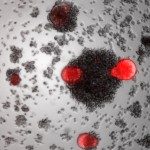Link to Pubmed [PMID] – 26666402
Bioconjug. Chem. 2016 Jan;27(1):247-56
The Nucleocapsid protein NCp7 (NC) is a nucleic acid chaperone responsible for essential steps of the HIV-1 life cycle and an attractive candidate for drug development. NC destabilizes nucleic acid structures and promotes the formation of annealed substrates for HIV-1 reverse transcription elongation. Short helical nucleic acid segments bordered by bulges and loops, such as the Trans-Activation Response element (TAR) of HIV-1 and its complementary sequence (cTAR), are nucleation elements for helix destabilization by NC and also preferred recognition sites for threading intercalators. Inspired by these observations, we have recently demonstrated that 2,6-disubstituted peptidyl-anthraquinone-conjugates inhibit the chaperone activities of recombinant NC in vitro, and that inhibition correlates with the stabilization of TAR and cTAR stem-loop structures. We describe here enhanced NC inhibitory activity by novel conjugates that exhibit longer peptidyl chains ending with a conserved N-terminal lysine. Their efficient inhibition of TAR/cTAR annealing mediated by NC originates from the combination of at least three different mechanisms, namely, their stabilizing effects on nucleic acids dynamics by threading intercalation, their ability to target TAR RNA substrate leading to a direct competition with the protein for the same binding sites on TAR, and, finally, their effective binding to the NC protein. Our results suggest that these molecules may represent the stepping-stone for the future development of NC-inhibitors capable of targeting the protein itself and its recognition site in RNA.


